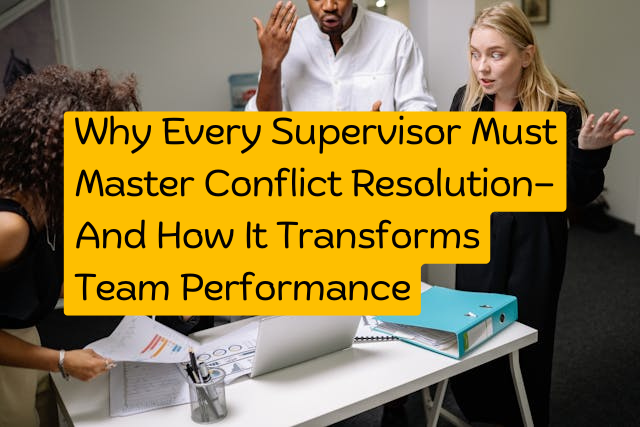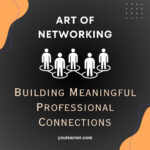Conflict Is Inevitable—But Chaos Isn’t
Wherever people work together, conflict will arise. Different personalities, pressures, goals, and communication styles mean disagreements are bound to happen—whether it’s between coworkers, departments, or even between employees and supervisors.
But here’s the truth: Conflict isn’t the problem. Avoiding it is.
Unresolved conflict erodes morale, stalls projects, and drives top talent out the door. Yet with the right tools, managers can transform tension into teamwork, turning disagreement into growth and innovation.
This blog explores why every supervisor needs to understand conflict resolution and difficult conversations—and how the “Why Every Supervisor Needs to Understand Conflict Resolution & Difficult Conversations” program equips them to lead with confidence, clarity, and control.
🚨 1. The High Cost of Avoided Conflict
Ignoring or mishandling workplace disputes leads to:
- 📉 Productivity drops
- 🧍 Employee disengagement
- 🔄 Increased turnover
- 💸 Wasted time and legal risk
- 😒 Damaged trust and communication
Studies show that managers spend 20–40% of their time dealing with conflict, often reactively. Imagine if they could use that time proactively to solve and prevent it?
🧠 2. Why Supervisors Are the First Line of Defense
Supervisors are not just task managers—they’re culture carriers and problem solvers. When trained effectively, they:
- Spot tensions before they escalate
- Mediate differences respectfully
- Support HR with clear documentation
- Foster a climate of openness and accountability
But without training? They may avoid hard conversations, escalate issues accidentally, or apply inconsistent standards.
🎯 3. What Conflict Really Is (And Isn’t)
Conflict is not:
- A sign of failure
- A personal attack
- Something to avoid at all costs
Conflict is:
- A signal that something needs attention
- Often rooted in unmet needs, miscommunication, or clashing values
- An opportunity for resolution and stronger relationships
Understanding this shift in mindset is the first step in the program.
🧱 4. The Core Components of Effective Conflict Resolution
The “Why Every Supervisor Needs to Understand Conflict Resolution & Difficult Conversations” program focuses on practical, repeatable frameworks supervisors can apply immediately:
🔍 1. Conflict Identification
- Recognize early warning signs
- Understand root causes (task, process, relationship-based conflicts)
🧭 2. Communication Techniques
- Active listening
- Neutral language
- Empathetic phrasing
- Clarifying questions
⚖️ 3. De-escalation Skills
- Managing emotional triggers
- Resetting tense conversations
- Reframing hostility into collaboration
💬 4. Conducting Difficult Conversations
- Structuring the conversation
- Setting expectations
- Keeping the dialogue constructive
📝 5. Documentation & Follow-Up
- Capturing key outcomes
- Setting action steps
- Following through consistently
📚 5. Program Overview: What Supervisors Learn
Module 1: Understanding the Nature of Conflict
- Why conflict happens
- How different conflict styles affect outcomes
- Myths about conflict at work
Module 2: Essential Skills for Tough Talks
- Assertiveness vs. aggression
- How to stay calm and professional
- Non-verbal communication cues
Module 3: A Framework for Conflict Conversations
- Step-by-step guide: Prepare → Initiate → Resolve → Follow up
- Sample scripts and roleplay exercises
Module 4: Legal, Ethical, and HR Considerations
- When to escalate
- What to document and how
- Avoiding bias and maintaining fairness
Module 5: Sustaining a Conflict-Healthy Culture
- Building team norms for accountability
- Psychological safety and trust
- Recognizing and reinforcing resolution behavior
🔧 6. Real-World Scenarios Covered in the Program
- An employee frequently clashes with coworkers over “tone”
- Two team members are competing for the same project lead
- A supervisor must address declining performance due to personal conflicts
- Remote team friction due to miscommunication
- A high-performer is creating a toxic atmosphere
For each case, the program provides resolution walkthroughs—what to say, how to say it, and what to avoid.
🎓 7. Skills Supervisors Walk Away With
By the end of the program, supervisors will be able to:
- Conduct respectful, results-oriented difficult conversations
- De-escalate emotional situations professionally
- Mediate disputes with confidence
- Recognize when to resolve, when to coach, and when to escalate
- Build stronger, more cohesive teams through honest dialogue
💼 8. Why This Training Is a Strategic Advantage
Organizations that invest in conflict resolution training for supervisors see:
- 📈 Higher employee satisfaction and retention
- 🤝 More effective leadership pipelines
- 🧭 Clearer alignment between teams
- 💪 Stronger HR-manager collaboration
- 🛡️ Reduced risk of legal disputes
In a world where leadership requires emotional intelligence, this program builds the practical, human skills that managers need most.
🧭 9. What Makes This Program Unique
Unlike one-off workshops or theoretical training, this program is:
- Scenario-based
- Action-focused
- Supported by templates, guides, and coaching scripts
- Designed for immediate implementation in the workplace
📢 10. What Supervisors Are Saying
“Before this, I avoided confrontation. Now I know how to lead through it.”
— Team Lead, Manufacturing
“This gave me the confidence and tools to handle even sensitive issues with professionalism.”
— Manager, Healthcare
“I finally feel equipped to support my team, not just manage them.”
— Supervisor, IT Firm
✅ Conclusion: Equip, Empower, and Elevate Your Leaders
Conflict isn’t the enemy. Silence is. And poorly handled conversations are expensive—financially and culturally.
If your supervisors struggle with tension, miscommunication, or difficult team members, it’s time to empower them with proven strategies.
The “Why Every Supervisor Needs to Understand Conflict Resolution & Difficult Conversations” program does more than train—it transforms. Because when supervisors grow, so do teams, trust, and performance.







